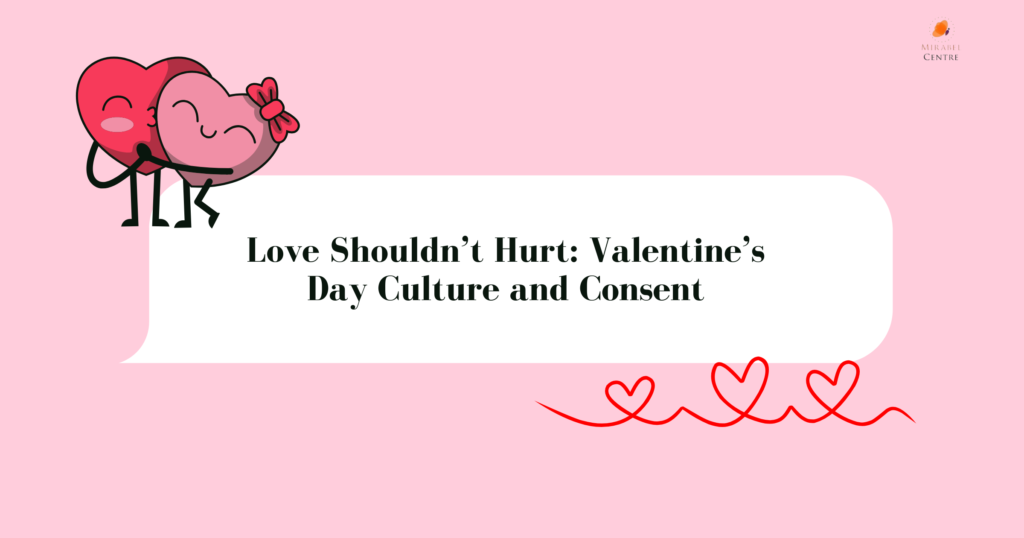Written by Boluwatife Fawole-Aderemi, Edited by Nancy-Olive Tamuno

It’s another February, the month of Love. Stores have pink and red heart-shaped chocolates displayed, flower shops with roses and special cards, and love is in the air. Valentine’s Day has long been a celebration of romance, passion, and affection. But beneath all these grand gestures and candlelit dinners is an important conversation that often gets overlooked, which is the role consent plays in relationships.
While Valentine’s Day is portrayed as a time for lovers, statistics show a darker reality. A study by the University of Calgary found that during holiday seasons, including Valentine’s Day, there is usually an increase in sexual and domestic violence incidents. In Nigeria, where cultural expectations around relationships and romance remain complex, discussions around consent are more critical than ever.
At the Mirabel Centre, between 2020-2024, we have noticed an increase in the number of survivors of sexual violence that we treat at the centre in February in comparison to other months of the year, and this reinforces the importance of the concept of consent.
Romance Without Pressure: The Truth About Consent
There’s usually an unspoken expectation around Valentine’s Day, the belief that expensive gifts and grand romantic gestures should be reciprocated with physical intimacy. This mindset fuels a dangerous narrative that a date night, gift or existing relationship automatically translates to giving consent. But it is important to always remember that consent is not implied. Consent is not a given, neither is it your birthright. It is freely given, enthusiastic, and temporary.
Understanding the concept of consent in a layman’s terms can give more perspective to it. Think of consent as simple as FRIES:
Freely Given: Consent should never be forced, pressured, or manipulated. An expensive gift or sophisticated dinner date does not mean consent, nor do societal expectations mean anyone “owes” you intimacy.
Reversible: Consent is not permanent and can be withdrawn at any time, even if it was given before.
Informed: There must be full disclosure of all details before consent can be given.
Enthusiastic: A “yes” should be clear, excited, and without hesitation. Silence, uncertainty, or reluctance is not consent.
Specific: Saying yes to a kiss or foreplay, for instance, does not mean saying yes to sex.
The Valentine’s Day Pressure and the Reality of Assault
Many people feel obligated to meet the expectations of Valentine’s Day, leading to situations where personal boundaries are compromised. This is very common among young couples due to many factors, including the media influence, for instance, media portraying persistence, coercion or emotional pressure as cute, societal factors like the “you owe me” mentality and much more.
Creating a Culture of Consent
Changing our perception of love, sex, and relationships starts with changing the conversation. Here’s how we can promote healthy, respectful love this Valentine’s Day and beyond:
1. Normalise Asking for Consent: Consent is not optional, whether you find it sexy or not, normalise asking questions like “Can I kiss you?” “Can I touch you?” “Do you want to have sex with me?”
2. Respect Boundaries, No Matter What: If someone says “no” or seems uncomfortable, it’s not an invitation to persuade them, it’s a boundary that should be honoured.
3. Educate Young People on Consent: Young people have a lot to learn about consent, and it is more important than ever to dismantle harmful beliefs about relationships and autonomy.
4. Challenge Harmful Valentine’s Day Culture: Call out media, movies, or personal interactions that romanticise toxic relationships, jealousy, or coercion as signs of love.
This year, let’s redefine love and make consent a part of every romantic gesture, every intimate moment, and every relationship we build. Because the best Valentine’s Day gift anyone can give is safety, respect, and the freedom to say “yes” or “no” without fear.

